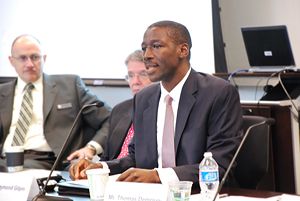- Africa Center for Strategic Studies
- Africa Center's Dean Gilpin Writes on "Peacekee...
Africa Center's Dean Gilpin Writes on "Peacekeeping in Africa and the Legacy of Austerity" for USIP Blog
Spending cuts and budget austerity by African governments in the 1990s and 2000s mean that African militaries and peacekeeping forces are historically inadequately resourced and poorly prepared and equipped for deployment, the Africa Center’s Academic Dean, Dr. Raymond Gilpin, wrote in May 28, 2013, blog articl

In his article, Dr. Gilpin noted:
- The April 2013 United Nations Security Council resolution to establish a 12,600-strong peacekeeping force in Mali was seen by most observers as an acknowledgement that the previous African-led force had failed.
- While the African Union peacekeeping mission in Somalia (AMISOM) could be cited as a qualified African-led success, questions are still being asked about the ability of regional initiatives to meet peacekeeping challenges across the continent.
- Most of this discussion occurs within the context of the African Union’s peace and security architecture and the inability of African militaries to respond to crises in a timely manner.
- Countries in sub-Saharan Africa spent less than 2 percent of their gross domestic product on defense each year between 1995 and 2010.
- Africa’s traditional bilateral and multilateral partners are generally reluctant to provide funding for Africa’s security sector, largely because of fears of misuse and/or human rights abuses.
For a number of reasons, Dr. Gilpin wrote, “African military forces are historically inadequately resourced and poorly prepared and equipped for deployment. It is unrealistic to expect the African Union’s peace and security architecture to be greater than the sum of its parts.”
He recommends “transformative approaches” to funding security sector reform, to include “the reorientation of security forces so that they become more aligned with current and emerging threats the continent faces.” Dr. Gilpin noted that “[m]ost African security forces are trained to confront traditional cross-border threats and not protracted low-intensity campaigns waged by a complex group of non-state actors, which are more common. ” Changing this approach “requires targeted investment in doctrine, training and equipment. ”
He also recommended an overhaul of the African Union’s Peace Fund, one of the five components of the peace and security architecture, to make it “more adequate, agile and accountable. Among other things, this could become a catalyst for much-needed change by targeting investment in Africa’s security sector, while pooling African and donor resources”
The full text of Dr. Gilpin’s blog is at the following link:
http://inec.usip.org/blog/2013/may/28/peacekeeping-africa-and-legacy-austerity
